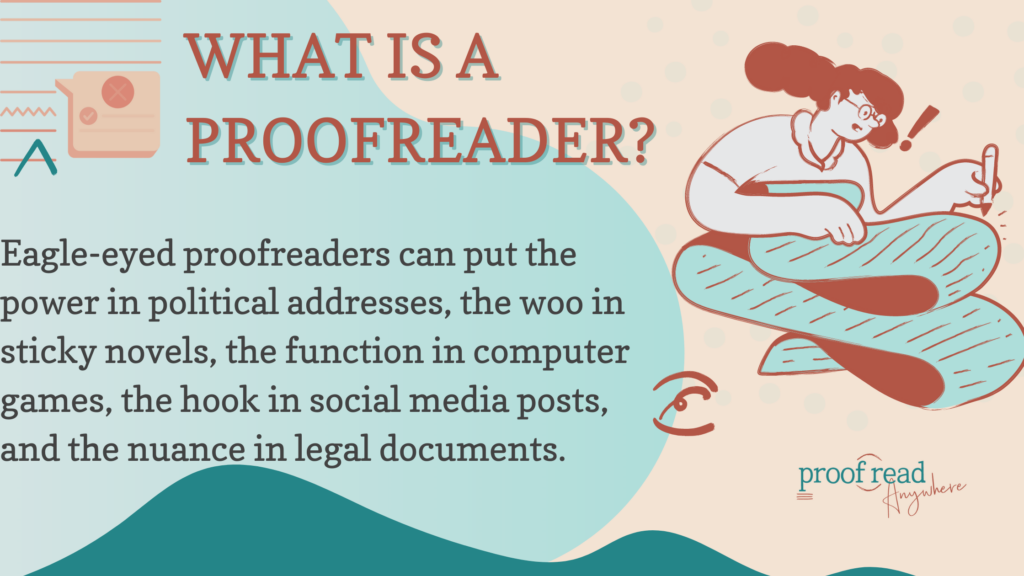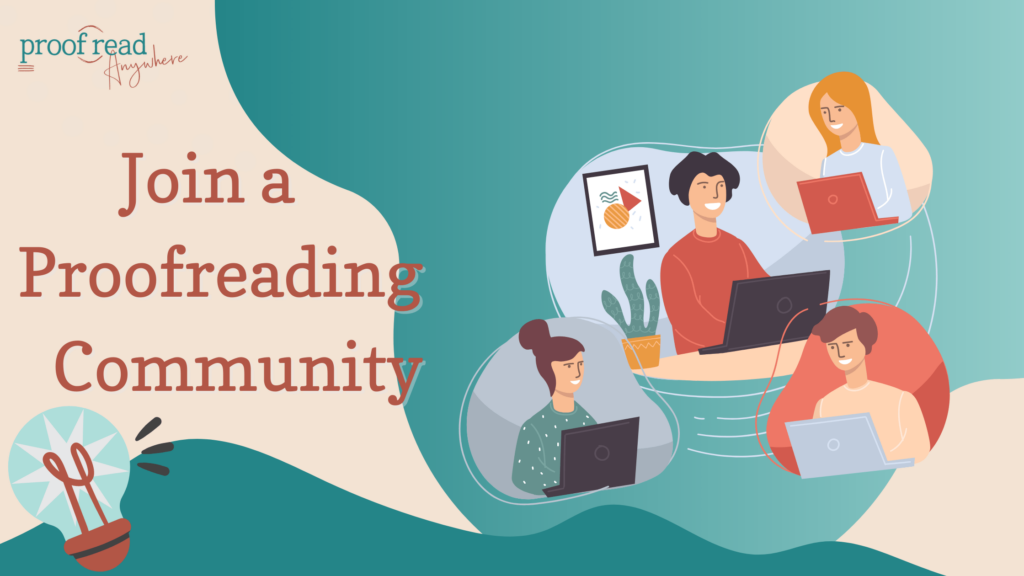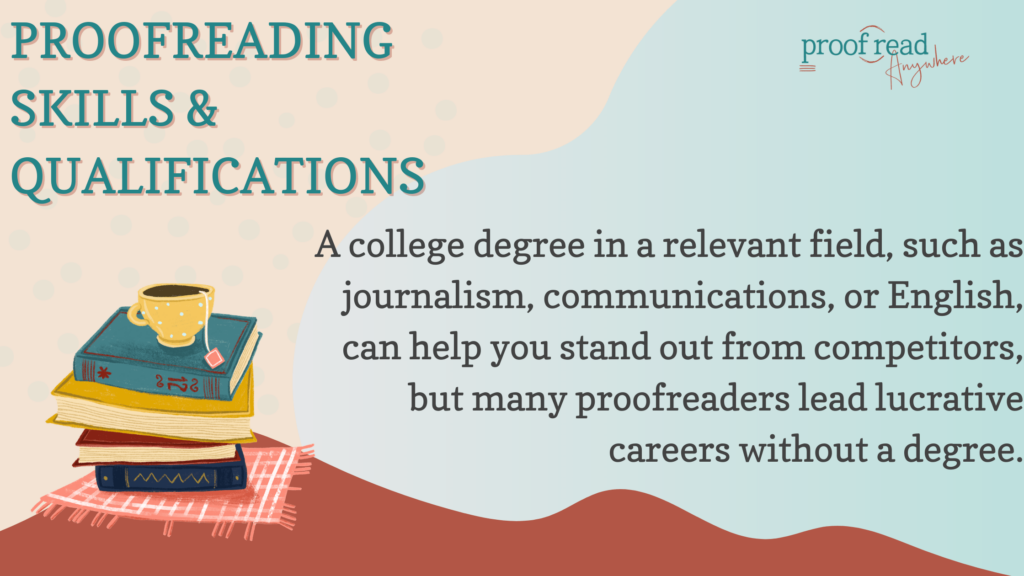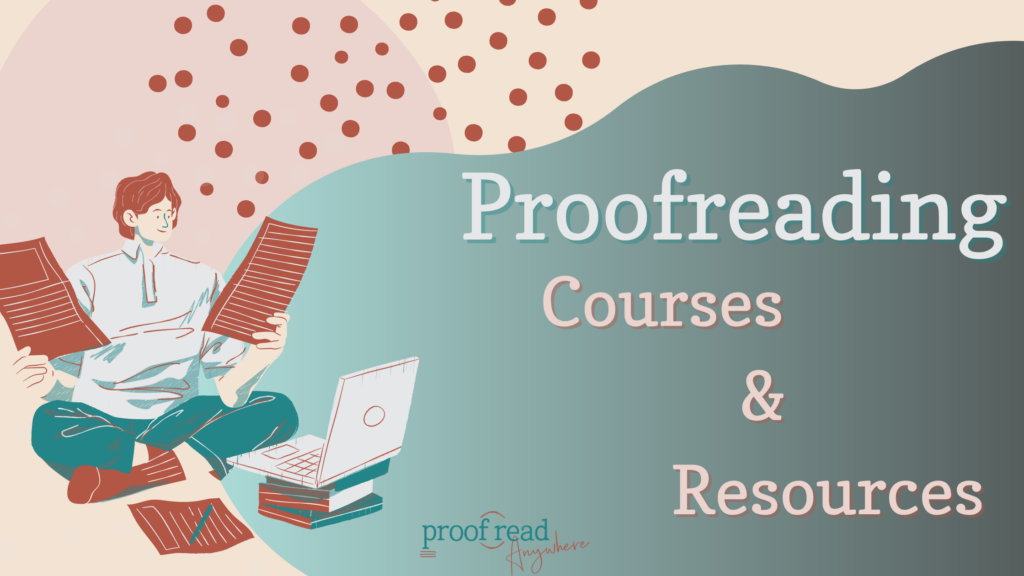Are you an avid reader with a knack for spotting typos in all kinds of documents? Are you looking for meaningful work you can do from home? If you answered yes, then a proofreading career could be the opportunity you’re looking for.
According to the Bureau of Labor Statistics (BLS), in-house proofreaders earn an average of $46,010. Self-employed or freelance proofreaders earn $37,500 to $63,000 per year depending on experience, rates, and niche.
In this article, we discuss exactly how to become a proofreader from home, with or without a degree. We will talk about the top resources, finding proofreading jobs, and successfully marketing yourself as a freelance proofreader.
What Is a Proofreader?

A proofreader is a professional within the publishing industry who checks documents, after they have been edited, and marks any grammatical issues, punctuation problems, formatting errors, and much more to ensure that the document is error-free before publishing.
Professional proofreaders are methodical individuals who ensure that written materials are error-free before any text is released for publication. These professionals fix punctuation and spelling errors, find typos, and make sure texts follow style guides.
Without successful proofreaders, miscommunications and misunderstandings would leave the world of words in a jumbled mess. These professionals can put the power in political addresses, the woo in romance novels, the function in computer games, the hook in social media posts, and the nuance in legal documents.
However, humans aren’t the only ones who need proofreading. To help translate the world, artificial intelligence machines rely on online proofreaders to catch errors and improve functionality.
Proofreading is best suited to enthusiastic readers who have an eye for detail. The best proofreaders know the intricacies of grammar rules and style guides and can communicate effectively.
Proofreading vs. Copyediting
The roles of proofreader and copyeditor can be confused. It is crucial to understand your specific role or, if you are performing both, the necessary skills for each publishing step.
Copyediting comes before proofreading. Copy editors ensure that each text reflects the author’s identity and tone of voice. These editors fix clunky transitions, fact-check content, improve flow, and tackle wordiness.
Next, proofreaders follow the copyedit by marking grammatical errors, punctuation mistakes, and spelling issues to ensure that the text is free from mistakes before publishing.
Freelancers can choose to offer proofreading, copyediting, or both services. Copyediting takes longer and typically pays more than proofreading. According to Indeed, copy editors in the U.S. have an average salary of $54,557, or $36.54 per hour.
How to Become a Proofreader
You can become a proofreader by taking online courses, brushing up on your grammatical skills, and learning how to market yourself as a freelancer! Most proofreaders don’t have degrees or previous work experience, and they are still able to be successful in their field.
Step One: Check That Proofreading is Right for You
Before you invest in an online course or a college curriculum, make sure that proofreading is something that you would truly enjoy and that you would be able to handle the stresses of freelancing.
Here’s an easy test to see if you have the most common proofreader qualities:
- Do you enjoy reading all kinds of documents? (if you’re interested in transcript proofreading, are you specifically interested in true crime?)
- Do you have eagle eyes that can spot even the smallest mistakes and errors? Do you find yourself catching mistakes in your day-to-day life?
- Are you able to keep yourself on task without other people prompting or motivating you?
- Do you enjoy working by yourself with very little interaction with others?
- Do you prefer staying at home instead of working in an office?
If you answered yes to most of these questions, then proofreading could be perfect for you!
Anyone can become a general proofreader if they possess, or are willing to learn, the following skills:
- An in-depth understanding of the English language
- Strong attention to detail
- Good time management
- A confident application of style guides — such as APA, Chicago, MLA, AP, MHRA, or a company’s in-house style guide
- Fluency with computer software — such as Word, Google Docs, and Excel — as well as efficient use of software shortcuts associated with formatting and grammar
- Great communication skills
- Excellent research skills
- An ability to work independently
- Strong marketing skills
- A willingness to engage and keep up to date with related industries
- Adaptability and flexibility
Though not every proofreader is born with the necessary skills needed to succeed, online courses and resources can help beginners and experienced professionals improve.
Step Two: Take a Proofreading Course
While we do offer a free proofreading workshop and a free 7-day proofreading course, you will need to invest in a full-length course if you want to be fully prepared and qualified to become a freelance proofreader.
At Proofread Anywhere, our courses will teach you everything you need to know as a beginner. The modules are regularly updated and we give students access to exclusive proofreading communities where students and course graduates can experience peer interaction and share advice with one another.
Here is a list of other resources that can help beginner proofreaders:
- Chicago Manual of Style (CMOS)
- Chartered Institute of Editing and Proofreading’s (CIEP) tests
- General sample proofreading tests
- Wikipedia’s complete list of proofreader’s marks
As proofreading services change with time and niche, proofreading communities can also provide valuable insights and resources.
General Proofreading: Theory and Practice
Though it may sound biased, Proofread Anywhere’s General Proofreading: Theory and Practice course is an ideal introduction to proofreading. As experienced proofreaders, our team regularly updates each module to give students and graduates the most accurate information. The course provides an overview of the industry and describes how beginners can start marketing themselves for online proofreading jobs.
The General Proofreading course is tailored specifically for students who want to pursue a freelance career as a proofreader. The class includes practice essays, graded exams, assignments, helpful resources, guidance on how to build a website with minimal expenses involved, and training on self-marketing and finding clients.
For students who have ample time to train, the course can take as little as 6 weeks, but we encourage students to take their time with the material to get a deeper understanding.
If you think that the course is right for you, or if you are on the fence, you can watch our free workshop to determine whether a proofreading career is right for you.
Transcript Proofreading: Theory and Practice
If you are interested in true crime, legal dilemmas, or spoken English conversations, transcript proofreading could be perfect for you. Transcript proofreading involves reading transcripts from court reporters and ensuring that the text is free of grammar mistakes while preserving the speaker’s voice and intentions. Compared to general proofreading, transcript proofreading is more complex and intense but can provide a higher and more consistent salary.
Proofread Anywhere’s Transcript Proofreading: Theory and Practice course was created for people who want to build their technical proofreading skills and specialize in a lucrative market.
The course includes nine intensive modules and dozens of assignments, resources, and practice materials of varying difficulty. Students also complete graded exams to prove their mastery of the course and gain access to an exclusive graduate community and preferred proofreader directory.
The course typically takes 2 to 4 months to complete and you can access a free, 7-day intro course to test your interest. You’ll learn proven self-marketing tips, how to tell if transcript proofreading is right for you, and common obstacles that new freelancers face (and how to avoid them).
Step Three: Join a Proofreading Community

While this step might seem unnecessary, we believe that it’s vital to understand the world of freelancing by surrounding yourself with fellow word nerds. For example, in every Proofread Anywhere course, we have an accompanying Facebook community that you can join to help you get through the course material, find jobs after graduating, and find support and advice from those who are in the same profession as you.
Joining a proofreading community, society, or association allows you to network with other proofreaders, discover new resources, access industry events, and promote your services to a wider audience.
Some of the most noteworthy proofreader communities include:
- The Editorial Freelancers Association (EFA) — A non-profit organization that supports freelancers’ careers. Members are given access to resources, virtual events, training courses, and various work opportunities submitted by clients. Yearly membership costs $145.
- Chartered Institute of Editing and Proofreading (CIEP) — A non-profit body that provides training, resources, and network support for editorial professionals. The CIEP has a tiered membership system based on proofreading experience. An entry-level membership is offered to new proofreaders and editors, while an advanced membership is available for editorial professionals with more than 1,500 hours of experience. Membership costs between $143 and $215.
- ACES The Society for Editing — Formerly known as the American Copy Editors Society, ACES is an international association exclusively for editors. The group offers annual conferences, member networking opportunities, regional workshops, scholarships, and an editor-for-hire online job board. Yearly membership costs $75.
- National Association of Independent Writers and Editors (NAIWE) — An association that seeks to provide professional support for freelance writers and editors. Members can access virtual training, career development events, and a dedicated NAIWE website to advertise their services. Yearly membership costs $99.
- Council of Science Editors (CSE) — An international association dedicated to editorial professionals in science industries. Members receive various benefits, including access to the directory, a mentorship program, and an annual online subscription to Science Editor, CSE’s quarterly publication. The CSE offers various membership categories, with membership ranging between $24 and $215.
- Proofread Anywhere Facebook Groups — PA students and graduates are given access to exclusive Facebook groups where they can engage with other students, ask questions, share experiences, and celebrate career successes. Members can also discuss challenges and find advice on all facets of proofreading and freelancing. Membership is free with the purchase of any Proofread Anywhere course.
Step Four: Market Yourself as a Proofreader and Find Clients

Becoming a freelance proofreader from home starts with putting yourself out there. Finding your first client can be daunting, but building your clientele is the best way to understand the market’s demands and strengthen your business.
Some freelancers prefer an ever-rotating client load with different short-term projects. Others find one or several clients with long-term contracts of several months or work on larger projects. Depending on your preference and niche, you can choose whether to focus your energy on maintaining relationships or searching for and marketing to new clients.
Remember that your ultimate goals for managing your freelance contracts can take time to realize, so start by marketing yourself to a few clients who offer work in your niche, build your proofreading skills, and hone your freelance work ethic.
We have compiled a list of where to find proofreading jobs online but other options include
- Hire a Proofreader — An online job board just for Proofread Anywhere graduates
- Online communities — Online communities, like the For Hire subreddit, advertise both in-house and freelance proofreading jobs.
- Facebook groups — Facebook groups tailored to proofreaders and copy editors sometimes have posts with job opportunities. Many Proofread Anywhere graduates have found jobs directly through our Facebook groups and students get free access to the groups when joining one of our courses.
- LinkedIn — Professional networking sites can connect employees and employers together and proofreading positions are often advertised on this platform.
- Other job boards — Companies such as Indeed, Glassdoor, ZipRecruiter, and Total Jobs often advertise proofreading jobs.
Marketing Yourself as a Proofreader
Without an effective, long-term marketing strategy for yourself, building your freelancer reputation, attracting clients, and maintaining a steady source of income can be difficult.
- Highlight your availability with a freelance profile — Build a profile on a freelance platform or job board that stands out and highlights the value you bring to the industry.
- Create a website — Show off your portfolio, market your services, and gather testimonials with a simple website.
- Use social media — Use websites like Instagram, Twitter, Facebook, and LinkedIn to network and spread the word about your services. Create profiles across your preferred platforms, update your content regularly, and follow and engage with potential clients.
- Reach out to prospective clients — Market directly to clients by crafting messages with these cold-emailing tips in mind.
- Use paid ads — Purchase an advertisement slot in a local magazine, newspaper, or social media website to advertise your services.
- Set up a proofreading blog — Writing a professional blog can show off your expertise (after all, our company started as a proofreading blog). Update the blog regularly and optimize its content for search engines (SEO) to attract more visitors.
Marketing yourself can be scary, but remember that perfection comes with practice. As you put yourself out there and take constructive feedback from your followers, you’ll get to know your audience better, and you’ll get better at reaching and maintaining clients.
Where to Start
Getting started as a proofreader can be daunting, but it’s a fulfilling and rewarding career that lets you work from anywhere.
To dive in, you’ll need to expand your vocabulary, practice proofreading, and master grammar and punctuation rules. If you aren’t able to self-study, you should take part in online proofreading courses, workshops, or seminars to improve your proofreading skills.
With the right attitude, tools, and approach, you’ll be on your way to a lucrative proofreading career in no time!
Not interested in proofreading? Check out our list of 15+ Work at Home Job Ideas.



What software is necessary to offer proofreading services?
Hi Elizabeth! At minimum, you’d just need access to Google Docs! Microsoft Word is common, too, but Google Docs is universal and easily collaborative.
Excellent article with a lot of useful information. I have enjoyed reading it and will certainly follow the guide in setting up my proofreader business. Thanks Proofreader Anywhere.
Elizabeth Owuor-Oyugi
Keny
I agreed when you stated that proofreaders can review for common word usage errors. My friend wants to ensure that all her papers are error-free. I should advise her to opt for an online proofreading service to get her papers checked.
You’d be more than welcome to look through our graduate directory to find a proofreader to hire. https://my.proofreadanywhere.com/the-graduate-directory/
Excellent article. Thank you for all the time and effort poured into sharing such indispensable information. This guide has me seriously considering a new career in freelance proofreading! Please forgive me for seeking clarification, but I noticed “Step 9:…” is listed twice consecutively. Is it meant to be a two part step? Thank you again! Cheers ????
How do you structure your billing? Before, after, during, or a combination of the aforementioned? Thanks in advance.
Every piece of writing needs proofreading magic before getting published. Leftover errors are unprofessional and distract readers from the intended message.
Is Open Office suitable for performing such services or should I purchase a professional M.Office package?
We teach you how to use several software programs in the course, however, Open Office isn’t one of them, and I’m not familiar with it, so you would have to do some research to find out if it would work for you. Google Docs is free, and we provide an instructional section on this software program in Module 6 of the course.
In your article you use the phrase, “For student that …”
Based on my grammar education the above wording would be incorrect. It should read, “For students who …” as the word “that”, as used in this instance, infers an inanimate object. This is one of the most common mistakes I’ve noticed in both written and oral communications.
Thank you for alerting us of the error! We’ll get that corrected!
I'm grateful to you for giving me such a lovely platform to learn more new things, as demonstrated by this article, which provided me with the actual valuable information.
great post
Proofread Anywhere's article on setting up a proofreading business is a must-read for anyone serious about starting their own freelance career. It is packed with useful information and practical advice, and it is clear that the author is genuinely passionate about helping others succeed.
Hey there! This post got me thinking about how proofreaders not only polish content but add that special touch to diverse industries. From political speeches to video game scripts, it's fascinating how they shape the message. Excited to explore this career path
Thank you for fostering an environment where everyone's opinion is valued.
Thank you for the kind words, Tim! We love to hear feedback like this from our students! It makes all the hard work we do here at PA worthwhile when our students take the time to share positive comments like yours!😊